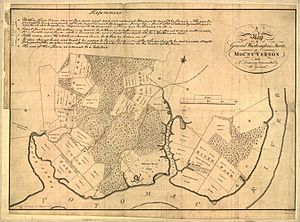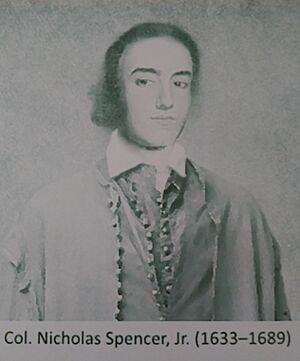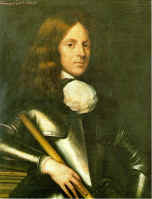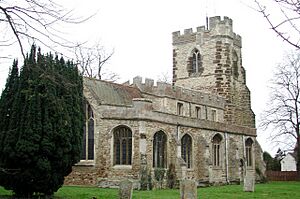Nicholas Spencer facts for kids
Nicholas Spencer, Jr. (born 1633, died 1689) was an important person in early colonial Virginia. He was a merchant, a large farm owner (called a planter), and a politician. Spencer was born in Cople, Bedfordshire, England. He later moved to Westmoreland County, Virginia, where he became a planter. He also represented Westmoreland County in the Virginia House of Burgesses, which was like their local government.
Nicholas Spencer also served as the Secretary and President of the Council of the Virginia Colony. When his cousin, Thomas Colepeper, 2nd Baron Colepeper, left Virginia in 1683, Spencer became the Acting Governor. He served in this role until the new governor arrived in 1684. Spencer also helped his cousin, John Washington (who was an ancestor of George Washington), get the land for what is now the famous Mount Vernon estate.
Contents
Early Life and Moving to Virginia
Nicholas Spencer came from an important English family that had lived in Cople, Bedfordshire, for a long time. His family was connected to other well-known Spencer families and shared a coat of arms, which is a special family symbol. In 1531, his family bought a large estate called Rowlands at Cople, and they owned it for many centuries.
Nicholas Spencer moved from London, England, to Westmoreland County, Virginia, in the 1650s. He worked as an agent for his cousin, John Colepeper, 1st Baron Colepeper. An agent is someone who manages business for another person. John Colepeper had inherited a share of the Virginia Company, which was a group that helped start the Virginia colony. He also owned a large area of land in Virginia called the Northern Neck. John Colepeper never lived in the colonies, and his son, Thomas Colepeper, 2nd Baron Colepeper, didn't arrive until 1680. So, Nicholas Spencer came to Virginia to help manage his cousin's land and investments.
Becoming a Leader in Virginia
When Nicholas Spencer arrived in Virginia, he quickly got important jobs. He became a customs collector, which meant he collected taxes on goods coming into the colony. He also managed his cousin's large estates in Virginia. For example, he would collect animal furs or tobacco from people who owed money to the Colepeper family. Spencer and John Washington worked together as customs collectors on the Potomac River. After Washington died in 1679, Spencer did this job by himself.
Spencer also received his own land grant, which was a gift of land from the government. He was known as a very good administrator. He was also a tough businessman. When it came to the topic of slavery, Spencer looked at it only from a business point of view. He wrote that "The low price of Tobacco requires it should bee made as cheap as possible, and that Blacks can make it cheaper than Whites." This shows his harsh view on using enslaved people for labor.
Spencer had a difficult job as a leader in the new colony. He had to deal with many challenges. While he was trying to explain slavery, he also wrote to the English government about Virginia's problems. He worried about people causing trouble, especially those who used religion as an excuse to fight. He mentioned fears that a few Catholics in Maryland and Virginia might try to hire Native American tribes to attack Protestants.
At the same time, Virginia was growing very fast because of tobacco farming, which relied on slavery. This made Spencer's job even harder. There were also big uprisings, like Bacon's Rebellion, and times when people destroyed tobacco plants. In 1674, it was noted that Spencer's own lands were damaged because he opposed Bacon's Rebellion.
In 1682, Spencer wrote to London about the problems in Virginia. He said that Bacon's Rebellion had left a feeling of unrest. He saw that tensions between different groups of people were still strong. He described a "mutinous mob" that went from farm to farm, pulling up tobacco plants. The government reacted strongly with patrols and big fines. Spencer said this "frenzy" destroyed crops on over 200 farms. It happened because there was too much tobacco, which made prices very low. Spencer even wrote that wives continued to pull up plants after their husbands stopped. He understood that this kind of protest was a challenge for colonial leaders.
When Spencer became ill, he wrote to his brother in England, describing his pains. He asked his brother to see an English doctor and send him the diagnosis quickly.

Being an agent for his Colepeper cousins was not easy either. The Colepeper family owned a huge amount of land in Virginia, over five million acres. This land was later passed to the Fairfax family. Many colonists saw this as a reminder of English noble power. Since the Colepepers were not in Virginia, it was Spencer's job to collect rents and taxes on this vast land.
Spencer married Frances, the daughter of Colonel John Mottrom. Mottrom was likely one of the first white settlers in the Northern Neck area. He was also the first representative for Northumberland in 1645. Nicholas and Frances Spencer named one of their sons Mottrom after John Mottrom. Another Spencer son, William, went to England for school and stayed there. He became a Member of Parliament for Bedfordshire. William Spencer married Lady Catherine Wentworth. After William died young, his brother Nicholas Jr. went back to England to take over the family estates there.
Nicholas Spencer was very important in the Virginia colony. He lived on his large farm near Nomini Creek. In 1668, the local Anglican church area, Cople Parish, was renamed to honor Spencer and his English hometown of Cople. The Spencer family was also related to the Washington family in both England and Virginia.
In 1674, Colonel Spencer and his cousin, Lieutenant Colonel John Washington, received a land grant of 5,000 acres at Mount Vernon. Spencer helped make this deal happen because he was an agent for his cousin Thomas Colepeper, who controlled the Northern Neck of Virginia where the land was located.
Spencer's Business and Later Life
When John Washington died in 1677, his son Lawrence (who was George Washington's grandfather) inherited his father's share of the Mount Vernon property. After Nicholas Spencer died, the Washington and Spencer families divided the land. The Spencer family took the southern part of Mount Vernon, and the Washingtons took the part along Little Hunting Creek. The Spencer heirs paid Lawrence Washington 2,500 pounds of tobacco for their choice. Later, the Washington family bought out the Spencer family's share of Mount Vernon.
Besides managing the Colepeper family's business, Spencer was often involved in Virginia Colony affairs. He frequently wrote to English leaders in London and to his family in England. When his cousin Thomas Colepeper left Virginia in 1683, Spencer was named Acting Governor. He served in this role for nine months until April 1684, when Francis Howard, 5th Baron Howard of Effingham arrived. Because his brothers died young, Spencer was the only surviving son of his father. This meant he inherited many family estates in England.
Other important early settlers in Westmoreland County also left land to Spencer. For example, in 1674, Lieutenant Colonel John Washington said that his relative Richard Cole had left all his Virginia lands to Nicholas Spencer in his will. Richard Cole was a bit unusual; he even asked to be buried in a black walnut coffin with a special gravestone from England that had a funny poem on it.
Nicholas Spencer died in Virginia in 1688. In his will, he described himself as "of Nominy in Westmoreland Co. in Virginia." Nicholas Spencer had five sons: William, Mottrom, Nicholas Jr., John, and Francis (who inherited Mount Vernon from his father). Spencer likely also had at least two daughters, Elizabeth Spencer and Lettice Barnard. In his will, Spencer asked his good friends, Colonel Isaac Allerton Jr., Captain George Brent, and Captain Lawrence Washington, to manage his estates. Captain Washington was the younger brother of Lieutenant Colonel John Washington.
After Nicholas Spencer's death, his family's 6,000-acre farm at Nomini in Westmoreland was sold. In 1709, Robert Carter I bought the Spencer property for £800. This marked the end of the Spencer family living in Westmoreland. This land later became Nomini Hall, the main home of the Carter family.
The English part of the Spencer family continued to live in Bedfordshire, England. They owned large amounts of land and some family members served in Parliament. The Spencer family owned their land at Cople, Bedfordshire, until the 1800s.
Images for kids
-
Survey of the land grant at Little Hunting Creek to Col. Nicholas Spencer and Lt. Col. John Washington, which is now the Mount Vernon estate. This survey was done in 1674.
 | Victor J. Glover |
 | Yvonne Cagle |
 | Jeanette Epps |
 | Bernard A. Harris Jr. |





